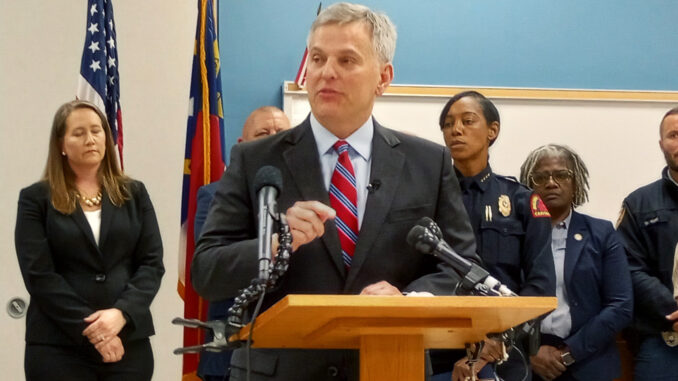
RALEIGH — Flanked by more than two dozen law enforcement officials, former lawmakers and victim advocates, North Carolina Attorney General Josh Stein announced last Tuesday that the State Crime Lab has cleared the state’s rape kit backlog.
“Today is a great day: North Carolina has ended the rape kit backlog,” said Stein. “I am incredibly proud of the bipartisan and collaborative effort that produced this achievement — Republican and Democratic legislators, district attorneys and law enforcement officers all played a critical role in ending the backlog.”
Stein also thanked the scientists at the State Crime Lab (SCL) who have “worked countless hours to get these kits tested,” as well as victims for resubmitting evidence to bring their offenders to justice.
Several solved cases were mentioned during the press conference, which featured remarks by a sexual assault survivor named “Linda.”
“I knew the value of DNA and prayed for DNA evidence to be found on my body,” she said, adding “The kits give the victim a voice.”
Per the rape kit tracking dashboard, 11,841 of the 16,221 kits have been tested or are in the process of being tested as of April 2024. The 1,405 kits that have not been tested are due to being “unreported or anonymous.”
Of those 11,841 kits, 5,075 were entered into the CODIS DNA database, producing 2,702 hits. The 2,024 tested inventory kits came back with hits to offenders with DNA on file. So far, 114 arrests have been made based on those hits.
The Survivor Act, passed in 2018 by the General Assembly, has provisions aimed at preventing a backlog from occurring again. The law mandates the “collecting agency” must inform the relevant law enforcement agency within 24 hours of collecting a kit, and the law enforcement agency is required to get the kit from the collecting agency within seven days of notification. Law enforcement must then forward “reported crime” kits to the Crime Lab and “unreported” kits to the Department of Public Safety within 45 days.
In his remarks, Stein said he prioritized ending the backlog since taking office in 2017.
The backlog, however, has a more than 20-year history tied to Gov. Roy Cooper, who served as state attorney general for 16 years before being succeeded by Stein.
When Cooper ran for governor in 2016, he claimed he had cleared a “5,000-deep” DNA testing backlog from when he first took office in 2001. Yet when Stein became attorney general, North Carolina ranked No. 1 in the country with more than 15,000 untested rape kits.
Under the Survivor Act, an inventory audit conducted in 2019 revealed there were more than 16,000 untested kits across the state.
The act also provided $6 million in funding over two years for testing the kits, and the legislature contributed another $9 million that included increases in staff and pay.
The U.S. Department of Justice had also given the state $2 million via its Sexual Assault Kit Initiative (SAKI). An additional $2 million came from the Victims of Crime Act through the Governor’s Crime Commission, however, the bulk of that money was returned due to funding criteria changes.
Stein’s announcement drew criticism from Matt Mercer, the NCGOP communications director. Mercer is the former editor-in-chief of the North State Journal (NSJ).
“After eight years, Josh Stein finally has completed a basic function of his job as attorney general,” Mercer said in a statement. “After eight years, the State Crime Lab has ‘cleaned up’ the mess left by his predecessor, Governor Roy Cooper. It’s sad this even needs to be celebrated and justice has been delayed far too long for too many victims. It is a credit to the increased funding and oversight provided by the Republican-led General Assembly that this dark chapter is finally closed.”
The N.C. Democratic Party has not issued a statement on Stein’s announcement.
NSJ asked Stein during his press conference what led him to look at the backlog or who told him about it. Stein said SCL Director John Byrd brought it up.
“Director John Byrd and I were talking, and at that point there was no backlog of untested sexual assault kits at the crime lab other than the normal inventory in the course of doing business,” Stein said. “But I asked them were their kits at local law enforcement that never had made their way to the crime lab, and he said that he thought so.”
Byrd was appointed SCL director by Cooper in June 2014 and was replaced by Stein in 2019 with Vanessa Martinucci, who later resigned in October 2023. Leslie Cooley Dismukes is the current acting interim director.
Stein said Byrd had been working with law enforcement to “try to get a handle on it,” and asked for estimates but they were “very rough estimates.”
“And so we were very happy when the legislature directed local law enforcement to provide that data to the crime lab so we could conduct a formal inventory,” said Stein. “And that’s when we discovered that there were 16,000, and that’s when alarm bells went off among all of us and we had to get to work.”
Stein said the process has taken more than two decades because before he took office law enforcement agencies were told not to submit kits to the SCL unless they had a “known suspect.”
He also said the science is much better today than it was 20 years ago.
“So the importance is much greater today, therefore, the diligence with which we are pursuing this initiative is greater today,” Stein said.


